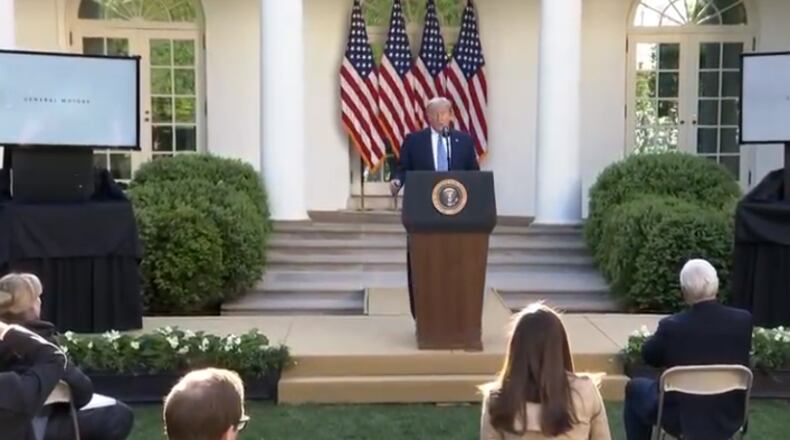In the midst of the ongoing battle to deal with the negative impact of the Coronavirus, President Donald Trump on Wednesday demanded that the Senate approve a series of his Executive Branch nominations, or else he would use a power in the Constitution never exercised by a President before, to go around the Senate and make formal administration appointments.
"It is a scam what they do," President Trump said, denouncing delays in the Senate for some of his nominations, as he rattled off a series of nominees which he said would help in the fight against the Coronavirus.
"The Senate should either fulfill its duty and vote on my nominees, or it should formally adjourn, so I can make recess appointments," the President said in the White House Rose Garden.
While Mr. Trump blamed Democrats for the lack of action, several of the nominations he listed to reporters were languishing in Senate committees, indicating opposition from Republicans.
The President noted a series of nominations which he said deserved Senate attention, especially as the nation deals with the threat from the Coronavirus outbreak:
+ The Director of National Intelligence. No hearings have been held by the Senate as yet on his nominee, Rep. John Ratcliffe (R-TX), who was nominated on March 2, 2020.
+ Two picks for the Federal Reserve. Hearings have been held by the Senate Banking Committee, but no committee votes have been scheduled on the President's nominees, as there is opposition among GOP Senators to the choices.
+ An Assistant Treasury Secretary dealing with financial markets. This nomination is ready for Senate floor action.
+ A nominee for the board which oversees the Voice of America. That nomination also is stuck in committee, which signals a lack of Republican support.
+ An Undersecretary of Agriculture responsible for administering food security programs. That nominee, Brandon Lipps, was chosen back in January. No hearing has been held on the nomination.
As for how the President would exercise this power - which is in the Constitution - to force the Congress to adjourn, parliamentary experts said the Senate would have to first approve a resolution providing for adjournment, setting up a 'disagreement' with the House, and allowing the President to step in.
But under Senate rules, such an adjournment resolution could be filibustered - requiring 60 votes to move ahead - or would need the unanimous consent of Democrats, something which is unlikely to happen.
Without Senate approval of an adjournment resolution, the President would seemingly have no Constitutional power to invoke.
About the Author
The Latest
Featured


